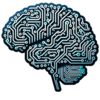
Back ديب مايند Arabic Google DeepMind Azerbaijani دیپمایند AZB Google DeepMind Catalan DeepMind German DeepMind DIQ DeepMind Greek DeepMind Esperanto Google DeepMind Spanish DeepMind Estonian
 | |
| |
| Company type | Subsidiary |
| Industry | Artificial intelligence |
| Founded | 23 September 2010 (incorporation)[1] 15 November 2010 (official launch)[2] |
| Founders | |
| Headquarters | London, England[3] |
Key people | |
| Products | |
| Revenue | |
| Owner | Alphabet Inc.[5] |
Number of employees | c. 2,600 (2024)[6] |
| Parent | Deepmind Holdings Limited[7] |
| Website | deepmind |
| Part of a series on |
| Artificial intelligence |
|---|
DeepMind Technologies Limited,[1] trading as Google DeepMind or simply DeepMind, is a British-American artificial intelligence research laboratory which serves as a subsidiary of Alphabet Inc.. Founded in the UK in 2010, it was acquired by Google in 2014[8] and merged with Google AI's Google Brain division to become Google DeepMind in April 2023. The company is based in London, with research centres in Canada,[9] France,[10] Germany, and the United States.
DeepMind introduced neural Turing machines (neural networks that can access external memory like a conventional Turing machine),[11] resulting in a computer that loosely resembles short-term memory in the human brain.[12][13]
DeepMind has created neural network models to play video games and board games. It made headlines in 2016 after its AlphaGo program beat a human professional Go player Lee Sedol, a world champion, in a five-game match, which was the subject of a documentary film.[14] A more general program, AlphaZero, beat the most powerful programs playing go, chess and shogi (Japanese chess) after a few days of play against itself using reinforcement learning.[15]
In 2020, DeepMind made significant advances in the problem of protein folding with AlphaFold.[16] In July 2022, it was announced that over 200 million predicted protein structures, representing virtually all known proteins, would be released on the AlphaFold database.[17][18] AlphaFold's database of predictions achieved state of the art records on benchmark tests for protein folding algorithms, although each individual prediction still requires confirmation by experimental tests. AlphaFold3 was released in May 2024, making structural predictions for the interaction of proteins with various molecules. It achieved new standards on various benchmarks, raising the state of the art accuracies from 28 and 52 percent to 65 and 76 percent.
- ^ a b "DeepMind Technologies Limited overview - Find and update company information - Gov.uk". Companies House. 23 September 2010. Retrieved 14 December 2024.
- ^ "DeepMind and Google: the battle to control artificial intelligence". The Economist. Retrieved 22 September 2024.
- ^ "King's Cross – S2 Building – SES Engineering Services". ses-ltd.co.uk. Retrieved 14 July 2022.
- ^ a b c "Full accounts made up to 31 December 2023". Companies House. 7 October 2024. p. 11.
- ^ "Deepmind Holdings Limited persons with significant control – Find and update company information – GOV.UK". Companies House. 30 August 2019. Retrieved 7 May 2024.
- ^ Langley, Hugh (16 May 2024). "How Google CEO Sundar Pichai shook up his leadership team for the AI era". Business Insider. Archived from the original on 20 May 2024.
- ^ "Deepmind Technologies Limited persons with significant control – Find and update company information – Gov.uk". Companies House. 4 November 2019. Retrieved 14 December 2024.
- ^ Bray, Chad (27 January 2014). "Google Acquires British Artificial Intelligence Developer". DealBook. Retrieved 4 November 2019.
- ^ "About Us". DeepMind. 14 May 2024.
- ^ "A return to Paris". DeepMind. 14 May 2024.
- ^ Graves, Alex; Wayne, Greg; Danihelka, Ivo (2014). "Neural Turing Machines". arXiv:1410.5401 [cs.NE].
- ^ Best of 2014: Google's Secretive DeepMind Startup Unveils a "Neural Turing Machine" Archived 4 December 2015 at the Wayback Machine, MIT Technology Review
- ^ Graves, Alex; Wayne, Greg; Reynolds, Malcolm; Harley, Tim; Danihelka, Ivo; Grabska-Barwińska, Agnieszka; Colmenarejo, Sergio Gómez; Grefenstette, Edward; Ramalho, Tiago (12 October 2016). "Hybrid computing using a neural network with dynamic external memory". Nature. 538 (7626): 471–476. Bibcode:2016Natur.538..471G. doi:10.1038/nature20101. ISSN 1476-4687. PMID 27732574. S2CID 205251479.
- ^ Kohs, Greg (29 September 2017), AlphaGo, Ioannis Antonoglou, Lucas Baker, Nick Bostrom, retrieved 9 January 2018
- ^ Silver, David; Hubert, Thomas; Schrittwieser, Julian; Antonoglou, Ioannis; Lai, Matthew; Guez, Arthur; Lanctot, Marc; Sifre, Laurent; Kumaran, Dharshan; Graepel, Thore; Lillicrap, Timothy; Simonyan, Karen; Hassabis, Demis (5 December 2017). "Mastering Chess and Shogi by Self-Play with a General Reinforcement Learning Algorithm". arXiv:1712.01815 [cs.AI].
- ^ Callaway, Ewen (30 November 2020). "'It will change everything': DeepMind's AI makes gigantic leap in solving protein structures". Nature. Retrieved 31 August 2021.
- ^ Geddes, Linda (28 July 2022). "DeepMind uncovers structure of 200m proteins in scientific leap forward". The Guardian.
- ^ "AlphaFold reveals the structure of the protein universe". DeepMind. 28 July 2022.
